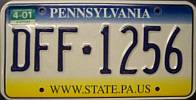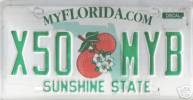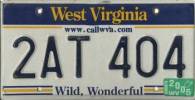


(Note: This editorial was originally classified under Web Journal Technology Talk, before I started commenting about license plates on a semi-regular basis.)
For years, automobile license plates have served two essential purposes: To identify vehicles, and to indicate whether or not the registration was current.
More recently, many jurisdictions have seized upon the use of license plates for another purpose: As a rolling billboard for a state. Certainly, this isn't an entirely new phenomenon--self-promoting slogans and graphics have persisted in some form or another for decades--but lately states have plugged their products and services in much more blatant manners.
 In 1999, the state of Pennsylvania introduced license plates carrying the novel slogan "WWW.STATE.PA.US." Then-governor Tom Ridge (uh...) commented that the new plate design was intended to indicate that Pennsylvania was "high tech, high energy and ready for the new millennium." Make of that what you will (I personally consider it a generic statement in the wake of the technology bubble of the time), but one thing it did do was start a trend.
In 1999, the state of Pennsylvania introduced license plates carrying the novel slogan "WWW.STATE.PA.US." Then-governor Tom Ridge (uh...) commented that the new plate design was intended to indicate that Pennsylvania was "high tech, high energy and ready for the new millennium." Make of that what you will (I personally consider it a generic statement in the wake of the technology bubble of the time), but one thing it did do was start a trend.
 Pennsylvania may have been the first state to put a web address on a license plate, but unfortunately it wasn't the last. In the years since, Florida, Georgia, Indiana, Maryland, Nebraska, West Virginia, and probably others I'm forgetting about have all obligingly followed suit. What they all have in common is that the URLs in question add little to the respective plate designs, and often look either invasive or tacked on to the design as an afterthought.
As far as invasiveness goes, Florida's is undoubtedly the worst in this regard: Not only does it promote a seemingly commercial website (.com), but from the looks of the license plate, the state name itself is "MyFlorida.com!"
Pennsylvania may have been the first state to put a web address on a license plate, but unfortunately it wasn't the last. In the years since, Florida, Georgia, Indiana, Maryland, Nebraska, West Virginia, and probably others I'm forgetting about have all obligingly followed suit. What they all have in common is that the URLs in question add little to the respective plate designs, and often look either invasive or tacked on to the design as an afterthought.
As far as invasiveness goes, Florida's is undoubtedly the worst in this regard: Not only does it promote a seemingly commercial website (.com), but from the looks of the license plate, the state name itself is "MyFlorida.com!"
 Aside from aesthetic considerations, why are website URLs on license plates a bad idea? First of all, it's a matter of appropriateness: If in past decades it wasn't considered proper for states to promote their services by silk-screening toll-free numbers or mailing addresses onto the plates, why are website URLs for the same purposes acceptable now? Furthermore, some of the URLs in use on license plates promote commercial websites or websites masquerading as commercial entities, as Florida's official state government website at MyFlorida.com would attest. (I'll save a rant about inappropriate domain names for another day.) Some states at least make (or originally made) a point of using their proper addresses along the lines of "http://www.state.ne.us/," but even so that practice was always the exception to the rule.
Aside from aesthetic considerations, why are website URLs on license plates a bad idea? First of all, it's a matter of appropriateness: If in past decades it wasn't considered proper for states to promote their services by silk-screening toll-free numbers or mailing addresses onto the plates, why are website URLs for the same purposes acceptable now? Furthermore, some of the URLs in use on license plates promote commercial websites or websites masquerading as commercial entities, as Florida's official state government website at MyFlorida.com would attest. (I'll save a rant about inappropriate domain names for another day.) Some states at least make (or originally made) a point of using their proper addresses along the lines of "http://www.state.ne.us/," but even so that practice was always the exception to the rule.
 Website addresses form a far less creative or memorable way to express the features of a state than a conventional slogan. I will always associate Pennsylvania as being the Keystone State and not the home of "WWW.STATE.PA.US," while the Peach State paints a much more picturesque image of Georgia than the impersonal "www.GEORGIA.gov."
Website addresses form a far less creative or memorable way to express the features of a state than a conventional slogan. I will always associate Pennsylvania as being the Keystone State and not the home of "WWW.STATE.PA.US," while the Peach State paints a much more picturesque image of Georgia than the impersonal "www.GEORGIA.gov."
Additionally, what about the issue of technological obsolescence? License plates are often (and should be) used for many years or decades on end. The Internet and online communications in general have changed a great deal in the last twenty years (remember the ARPANET?), and I have little reason to doubt that they will change a great deal more in years to come. Having website URLs on license plates will have the effect of producing relics of technology gone visible on cars for years after they ceased to be relevant. In some cases, the license plates have already outlived the websites they promote: The official website of Nebraska is now located at www.nebraska.gov, for example, and West Virginia's tourism address currently redirects to www.wvtourism.com.
 In late 2005 West Virginia began to omit the website URL (right) that had defaced its license plates for the previous five years, and I can only hope that it stays off. Websites and website URLs serve a variety of purposes and deserve to be mentioned and promoted in a variety of ways, but printing on automobile license plates for everyone trailing behind on the highway to see is definitely not one of them.
In late 2005 West Virginia began to omit the website URL (right) that had defaced its license plates for the previous five years, and I can only hope that it stays off. Websites and website URLs serve a variety of purposes and deserve to be mentioned and promoted in a variety of ways, but printing on automobile license plates for everyone trailing behind on the highway to see is definitely not one of them.